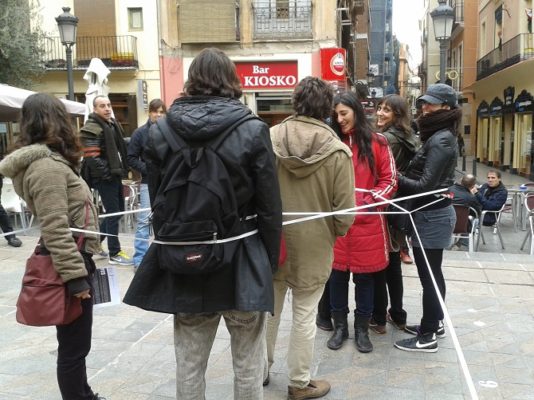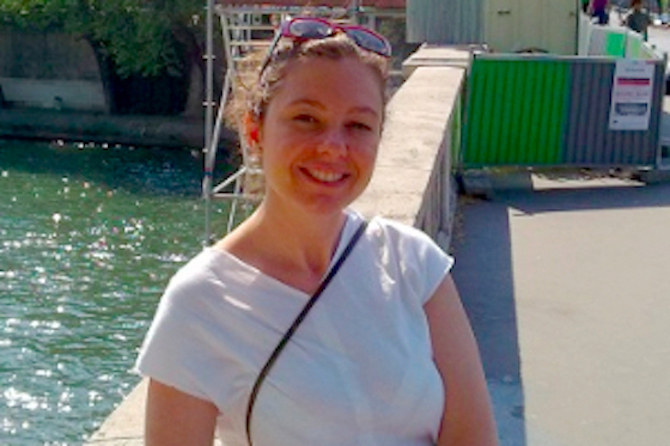Search
To search for an exact match, type the word or phrase you want in quotation marks.
A*DESK has been offering since 2002 contents about criticism and contemporary art. A*DESK has become consolidated thanks to all those who have believed in the project, all those who have followed us, debating, participating and collaborating. Many people have collaborated with A*DESK, and continue to do so. Their efforts, knowledge and belief in the project are what make it grow internationally. At A*DESK we have also generated work for over one hundred professionals in culture, from small collaborations with reviews and classes, to more prolonged and intense collaborations.
At A*DESK we believe in the need for free and universal access to culture and knowledge. We want to carry on being independent, remaining open to more ideas and opinions. If you believe in A*DESK, we need your backing to be able to continue. You can now participate in the project by supporting it. You can choose how much you want to contribute to the project.
You can decide how much you want to bring to the project.

The III encuentro for Creación Escénica Contemporánea (3rd Encounter for the Creation of Contemporary Theatre) organised by Óscar Cornago and Carolina Boluda took place last week in the Calderería, in Valencia. ¿A qué estamos jugando? (What are we playing at?) This central question of the encounter aimed to tackle questions about the concept of the game and the community, within the framework of creation and research into the performing arts, appealing to a heterogeneous group of professionals: artists, theorists, educators, researchers, architects, amongst others. The aim of this encounter was not just to reflect on the concept of the game but also to experiment with the very concept of the game through different proposals that emerged out of the group. The exploration of practice and the generation of knowledge through the body have been some of the constants during the sessions. Currently the performing arts play with the public by way of different participatory proposals. However participation is extending; some social organisations are generating new collaborative and participatory strategies around the commons, while social demonstrations and vindications incorporate performative elements and researchers propose new working methodologies based on participatory action. This growing interest in the group and in the potential of the group to generate events, strategies and synergies doesn’t seem by chance within the framework of a social and economic breakdown, in which alliances have led to the recuperation of discourses about community and the game, by Nancy, Caillois and Rancière among others. Claire Bishop and Shannon Jackson discuss the artistic and social value of these proposals from within the performing arts in their respective books Artificial Hells (2012) and Social Works (2011), delving into the nature of the spect-actor. In this sense, the game seems to be the inevitable object of analysis and debate, present in theatrical spaces as much as within the public arena and galleries and museums.
And what are the people gathered together in this encounter playing at? What artistic and social projects can be associated with the construction of more or less ephemeral communities? What is the nature of the theatrical practices that can be associated with playing? Within the framework of this encounter the participants had occasion to form part of Implosió Impugnadaa proposal by the artist Rafael Tormo. The contested implosion consisted in the generation of an event to construct community through the recuperation of popular culture. Specifically, Tormo’s proposal used traditional firecrackers and fire – typical of traditions like thecorrefoc or themascletà―to offer participants the opportunity to recuperate and appropriate the potential of these practices. The players tested through using these tools the sense of risk, participation and necessary limits in all forms of game playing and consequently all social games.
But if the implosion led them to recuperate the need for understanding the common through our very own cultural history, the performer Joseph Patricio proposed a reencounter with the value of our daily habits. So before going to the encounter he sent us an invitation, that he would come to our houses and cook a meal from our leftovers. A proposal to take a fresh look, to make us realise that when we say, “the fridge is empty”, there are still things with which we can construct and create. This metaphor takes on particular significance in the field of art, where the absence of resources is leading to the search for resources that are based on the encounter with the other, to generate a group and sense of community. Saoia Olmo, on his part, animated us to participate in a participatory dynamic by stating our desires that at the same time generated complicities and distances between the participants and enabled us to state some of the (im)possibilities of the game while a series of elastic bands redistributed the community in the public space.
Within a more formal framework we also had the opportunity of sharing and discussing the work of different national artists who are currently developing theatrical proposals around the game. This was the case of Rosa Casado who explained some of the site-specific art proposals that she has made in collaboration with the also British artist Mike Brooks. Part of her work focuses on generating encounters that feed off the very characteristics of the surroundings or the social and personal histories that configure it. The company Losquequedan made up of Vicente Arlandis and Sandra Gómez acquainted us with a series of art-experimental actions that are being developed around the concept of the game. Likewise the architectural studio PKMN showed some of their experiences that they have generated in relation to the construction of the city through processes of reactivating public space thanks to different methodologies of participation. These and other proposals were what gave way to describing the territories of the game and to considering what those of us who dedicate ourselves to the performing arts can play at within this social framework.
What are we playing at? In this encounter we play at getting to know each other, we play at not playing, we play to propose, we play so that they play with us, we play with surprise, with boredom, we play never ending games and ephemeral games, but above all we play at being our-selves. An our-selves, that is there to be constructed, and one that explains that art only makes sense within the possibilities of our-selves.

Esther Belvis originally thought her destiny was to dedicate herself to education, until she discovered the performing arts. She then understood that she was more interested in re-educating herself through the experience of art. Having grown up in the eighties, she now embraces the generation’s hangover in order to rethink artistic creation in the here and now. She understands the exercise of writing as a way of choreographing knowledge, giving it a second life, hoping that the text will trigger action and ricochet into reflection.
"A desk is a dangerous place from which to watch the world" (John Le Carré)